- Home
- Anne Bishop
Murder of Crows: A Novel of the Others Page 10
Murder of Crows: A Novel of the Others Read online
Page 10
“The Sanguinati are the dominant earth natives in the Toland Courtyard, backed by the Wolves and whatever else lives there. If any of them have gone missing …” Burke blew out a sigh. “This just gets better and better. All right, Lieutenant. You keep track of the investigation here. I’ll see if I can find someone in the Toland Police Department who doesn’t use his brains to wipe his backside.” He gave Monty a fierce smile. “I didn’t forget that you came from there, but you’re not one of them anymore.”
“Good to know.” Monty pushed out of the chair. Then he stopped. “Should I tell Simon Wolfgard what was found at that house and in the shop?”
“If there were any birds around those places, he probably already knows, so a courtesy call would be prudent.” Burke looked uncomfortable. “This isn’t the best time for it, but I’d like you to arrange a meeting between me and Mr. Wolfgard at his convenience.”
“Why?”
Burke took so long to answer, Monty wasn’t sure he would. “I want to ask him for a favor.”
CHAPTER 8
Steve Ferryman hustled to reach the passenger ferry before it cast off. He wasn’t scheduled to work today, hadn’t planned to do anything but watch a movie, do some laundry, and, later, walk over to the island’s bookstore and indulge himself with a couple of new novels. But he’d looked out the window when he woke up and felt that familiar, and not always welcome, tightening between his shoulder blades—and had a feeling that he needed to be on the ferry when it made its first run of the day between Great Island and the dock at the mainland half of the village called Ferryman’s Landing.
Several Crows huddled together on the deck, black feathers fluffed against the cold.
“Do you want to go inside the cabin?” Steve asked.
After a moment, one Crow shook its head.
“Let me know if you change your mind.”
A quick look in the passenger cabin confirmed it was empty. Totally empty. Absolutely, completely empty with no trace that anyone had been in there that morning. Which meant his aunt, Lucinda Fish, wasn’t planning to open the ferry’s little coffee bar and he would have to do without his morning dose of caffeine.
Sighing, Steve went up to the wheelhouse to see his younger brother, Will, who was the captain today.
“Good morning, Yer Honor,” Will said, tugging on his forelock. “I’m surprised to see you up and about so early on your sluggard day. Tell me, sir. Is this a personal trip, or are you traveling on government business?”
“Shut up,” Steve muttered.
In looks they were night and day. Steve took after his father, Charles, with dark hair and eyes, sharp features, and a strong but wiry build. Will had the blond hair and blue eyes that he’d inherited from their mother, Rachel, along with the slender grace that was common to all the members of the Fish clan.
“Is that any way to speak to one of your constituents?” Will asked.
“You didn’t vote for me,” Steve said. “And couldn’t, since you’re not on the village council.”
“And wouldn’t have even if I could have, since I know how much you wanted the job,” Will replied cheerfully. “Which is not at all.”
When it comes to being selected for a thankless job, the man who leaves the room just before the vote is the fool who gets the job, his father often said.
Which was how, by leaving the room to relieve his bladder because he’d thought the council was going to jabber on a while longer, Steve Ferryman had found himself voted in as the new mayor of Ferryman’s Landing at the tender age of thirty. The council members must have called for the vote the moment the restroom door closed behind him.
We had a feeling you’re what the village needs right now, they’d told him when he tried to decline.
When someone in Ferryman’s Landing had a feeling, you paid attention. The Intuits had survived and prospered well enough because they paid attention when someone had a feeling.
He hadn’t wanted to be mayor, even if it wasn’t a demanding job in a small village like this one. He was a ferryman by birth and by trade, and he’d rather be on the water than anywhere else. But now he was in charge of the island’s human government, for better or worse.
“Guess it’s good you’re not at the wheel today,” Will said. “You haven’t heard a thing I’ve said in the past couple of minutes.”
“Give me a break,” Steve growled. “I barely had time for a shower. Had to give up my morning coffee to get here.”
Will gave him an odd look. “Some reason you needed to get here?”
“I had a feeling.”
Will said nothing for a moment. Then, “I guess Aunt Lu had a feeling too. You didn’t hear me when I said she brought over an extra thermos of coffee and you’re welcome to have some.”
Steve spotted the thermos, and just the sight of it had his brain cells firing up enough to create real thoughts.
“May the river bless Aunt Lu,” he said, filling a mug. “You want some?”
“I want.”
Steve filled another mug and brought it over to his brother. Then he sighed. “Clear skies. Light winds.”
“Yep. Going to be a pretty day,” Will said. “Why do you sound disappointed?”
“I’m not disappointed. I just …” It was still there—that tightness between his shoulder blades was his personal warning sign that he needed to pay attention to something. “It feels like a storm is coming.”
“Dad didn’t say anything.” Will studied the sky and then the river. “Neither did Mom or Aunt Lu.”
“These feelings aren’t always right.”
“Yours aren’t usually wrong.”
No, he wasn’t usually wrong. At least, not when it came to the river and the weather. Intuits didn’t get feelings about everything, just the things that mattered to them as individuals. So his family had more knowing about water and weather while families like Sledgeman and Liveryman knew about freight and livestock, respectively.
The crossing was uneventful. As soon as the ferry docked, the Crows flew off, splitting up into a handful of small groups that headed in different directions. They would spend the day observing everything and everyone within range, then return in time for a ride back to the island.
After helping Will secure the ferry, Steve headed up to the main street as the mail truck drove down to the dock. Sacks of mail would be offloaded and mail for the island’s residents would be loaded. Not many passengers at this time of year—and the fee charged for passage helped discourage tourists.
Clear skies, light winds. Nothing to worry about. Even so, Steve kept looking back at the river.
What was he doing on the mainland side of the village? It was his day off. He could browse in the bookstore over here to pass the time until the ferry made the return trip, but the store on the island carried the same selection. In fact, since the Others purchased books from the island’s bookstore, it carried novels by terra indigene authors that weren’t available in mainland stores that might attract tourists who were visiting the area.
But a book didn’t explain the urgency to be on the ferry this morning.
Then he saw Jerry Sledgeman coming out of the drugstore holding a newspaper.
“Jerry!” he called.
Jerry stopped and raised a hand in greeting. “What are you doing here today?”
Jerry was a decade older and had a wife and teenage daughter, as well as two young sons. Despite the difference in years and circumstance, they were friends.
“I’m not sure.” Steve looked toward the river. “I just can’t shake the feeling that there’s a storm coming.”
When Steve turned back to look at him, Jerry held out the newspaper and pointed to a story in the Lakeside News. Something about birds being run over and a city worker being struck by one of the vehicles.
Not just any kind of birds, Steve realized as he continued reading. Crows. Someone had baited a street and waited for the Crowgard to show up, but only ordinary crows were killed.
&n
bsp; Jerry waited for him to finish reading, then said, “Now that you’re the mayor, maybe you’re developing feelings for a different kind of storm.”
Late Sunsday morning, Mr. Smith led his first client of the day to the interview room where Daisy waited for them. Unlike some of his associates, he preferred naming his girls rather than assigning them sterile designations. True, designations created a distance between the girls and their handlers, and it reminded the clients that the girls weren’t human in the same way they were human, making it easier for many clients to justify watching a girl bleed in order for them to receive a prophecy.
He, on the other hand, preferred a softer approach. And clients who wanted the special—and very lucrative—service he sometimes offered afterward found it more satisfying when they could whisper a name while enjoying the thrill of having the commonplace elevated to the exotic. The girls weren’t good sex partners. They were too stoned on their own euphoria to even remember if they’d had a penis inside them. But having sex with a blood prophet provided entrée into some social circles. After all, it took more than money to persuade someone like Mr. Smith to grant a client that extra time with a girl. It took ambition and the potential to become a mover and shaker in the highest of human circles.
The client who was about to face Daisy might be such a man. And depending on what the girl said, he might agree that the girl would enjoy a private session since the client had indicated a desire for the experience.
After seating the client in the chair directly in front of the girl, Mr. Smith sat in the chair a little to the side where he could watch client and prophet. The girl was draped with a blanket from neck to knees. Under that blanket she wore nothing but a G-string made of thin material that wouldn’t hide the juice brought on by the euphoria.
“Daisy,” Mr. Smith said quietly. “This man is running for the office of mayor in his city. He wants to know if using the Humans First and Last platform will help him win. What will the election bring?”
He repeated the same words over and over while the handlers removed the blanket. He’d already had a good idea what this client would ask and had already chosen the skin. A cut along the left side of the belly. The blood trickling from the cut would keep drawing the eyes to the G-string and add another layer of desire for the extra service.
“What will the election bring?” he asked as the handler finished the cut.
Daisy stared at the client, her face filled with the agony that came before the first words of the prophecy were spoken, releasing the addictive euphoria. Their need for that feeling was the reason cassandra sangue would cut themselves two or three times a day if they weren’t monitored and cut on a schedule.
“Tornado,” Daisy said, staring at the client. “Buildings with broken windows. Flowers growing through cracks in pavement. Vines climbing up walls. His face on a piece of paper, and the word ‘elect’ above the face. Paper blowing down an empty street.”
Closing her eyes, she moaned and tipped her pelvis up in invitation as the prophecy ended.
“What does that mean?” the client stammered. “What do any of those images have to do with the election or my chance of winning?”
Hopefully nothing, Mr. Smith thought. “It appears Daisy is experiencing some kind of upset and is unable to offer an accurate prophecy.” He rose. Taking a firm grip on the client’s arm, he escorted the man out of the room.
“What about my prophecy?” the client demanded. “I paid—”
“You will not be charged for today’s session,” Mr. Smith interrupted. “We’ll make an appointment for you next week with another girl.”
“Next week? But I have to make a decision before then!”
Mr. Smith stopped and looked the man in the eyes. “None of my girls are available until next week.” Meaning, come back then or find another establishment. Not as easy to do as it sounded. All the men who took care of cassandra sangue and sold the girls’ abilities recognized the need for some secrecy.
After handing over the client to one of the staff who would escort the man off the grounds, Mr. Smith returned to the interview room and studied Daisy. Her eyes were still glazed, but the euphoria had faded and she was starting to come around.
“Do you want her exercised?” one of the handlers asked.
“No,” Mr. Smith said. “Give her some water and a bite to eat, then let her sleep it off.”
An hour later, Mr. Smith sat in another interview room with the representative of a farming association that supplied food for several cities in the Midwest Region of Thaisia—an association that wanted to fiddle the books and claim a shortage in order to quietly sell grains to Cel-Romano.
He’d chosen Peaches for this cut. She was the most receptive girl he had for farming prophecies.
“What will grow best on our land this year?” the representative said. “What crops will do well?”
Mr. Smith repeated the questions as the handler made a cut above one of Peaches’s ripe breasts.
“Fire.” She sighed out the word. “Fire eats and eats. Water swallows. Plate clean. Food all gone.”
Mr. Smith walked to his office and closed the door. Then, giving in to the fear that had shuddered through him, he leaned his forehead against the door and closed his eyes. His handlers were experienced professionals and knew the girls. It was possible that they missed some sign that Daisy shouldn’t have been put on the roster today, but Daisy and Peaches speaking prophecies that had nothing to do with the questions?
Nothing wrong with my girls, Mr. Smith thought. And that means what they saw did, in fact, answer the questions.
A city’s destruction caused by an election. Fire and flood the only crops a Midwest farming association would harvest this year.
The girls could be wrong. A different decision, a different choice, and what Daisy and Peaches saw today wouldn’t happen.
But the people whose choices might make that difference probably were not on his client list. As much as he wanted to believe his movers and shakers were important men and women, they were only big fish in the small pond known as the Midwest Region.
If he wanted to understand why his girls’ prophecies were filled with so many images of destruction, he was going to have to seek advice from someone whose client list was more … expansive.
He loathed that bastard, but he didn’t know who else to call.
Mr. Smith poured himself a stiff drink, then sat at his desk and placed a call to the man known as the Controller.
CHAPTER 9
Meg pulled up in front of the Pony Barn. No Crows or Hawks or Owls around to report that she’d been there. And there was no reason for her to be there—no extra mail or packages to deliver. In fact, she’d ended up here because there was nothing else to deliver but she didn’t want to go home yet.
Usually she had the Quiet Mind class on Windsday evening and spent time with Merri Lee, Ruth, and Heather. But all the stores were closing at five p.m. because of some special meeting, and Simon had told her not to come back to the Market Square area after she closed the office for the day. Well, now that they were friends again, he had made an effort to sound as if he were asking her to stay away.
Of course, the word please sounded very different when it was snarled. But that was Simon, and friends accepted friends for who they were. She’d read that in a magazine recently.
Ask or order, it amounted to the same thing: the Courtyard’s business area was closed to everyone but the members of the Business Association and whoever else was attending the meeting. Even the efficiency apartments were off-limits tonight. Clearly the Others wanted this meeting to remain private.
So no Quiet Mind class, no friends, and no one but her at the Green Complex until this meeting was over and the Others returned to their apartments.
She hadn’t been alone at the Green Complex since the night men came into the Courtyard and tried to capture her and Sam.
Training images. Empty house with a door hanging off its hinges. Broken windo
ws. Debris blown into the corners of rooms.
Meg shook her head. She wasn’t abandoned. Being alone wouldn’t precipitate an attack. Would it?
Easy enough to get an answer. One cut to reassure herself that she would be safe until Simon and the rest of the Green’s residents came home. Just a small cut.
She looked at how her hands shook as she gripped the steeling wheel. When she was in the hospital, Dr. Lorenzo had said something about post-traumatic stress reactions, but she hadn’t paid attention and couldn’t recall his words.
Didn’t matter if she remembered the words or not. She had enough sense not to open the razor when her hands weren’t steady and there wouldn’t be anyone around to help her if something went wrong when she cut.
But I can’t dither around here all afternoon, she thought. And then, Too late.
Jester Coyotegard walked out of the barn and up to the driver’s side of the BOW.
“I wasn’t expecting a delivery,” Jester said, delicately sniffing the air when she rolled down the window to talk to him.
“I don’t have one for you,” Meg admitted.
A waiting pause. “Something wrong with the BOW?”
“No.” She knew that he knew there wasn’t anything wrong with her Box on Wheels. If there had been, she would have gotten out to ask for help. “It’s embarrassing.”
“In that case, tell me everything.”
He looked so gleeful, she had to laugh. But the amusement faded quickly. “No one else will be home until that meeting is over, and I’m … nervous … about being in the Green Complex by myself.” Darn Coyote must have picked that up with his first sniff and had been playing with her until he found out why she felt nervous. “I can’t really visit Sam at the Wolfgard Complex, and I didn’t want him to be away from the adult Wolves if something is going on ….”
Jester just studied her. If he knew what the meeting was about, he wasn’t sharing.

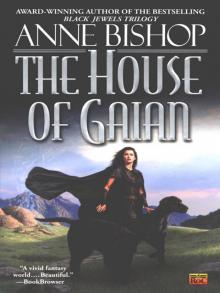 The House of Gaian
The House of Gaian Heir to the Shadows
Heir to the Shadows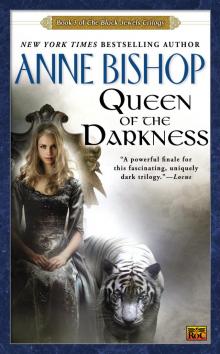 Queen of the Darkness
Queen of the Darkness Shaladors Lady
Shaladors Lady Written in Red
Written in Red Lake Silence
Lake Silence The Voice
The Voice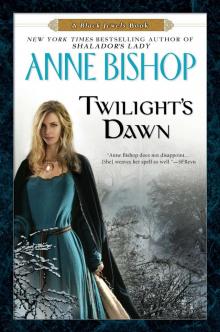 Twilights Dawn
Twilights Dawn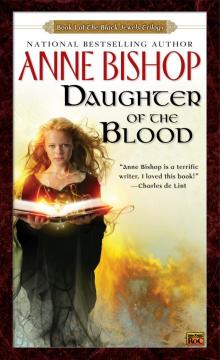 Daughter of the Blood
Daughter of the Blood Dreams Made Flesh
Dreams Made Flesh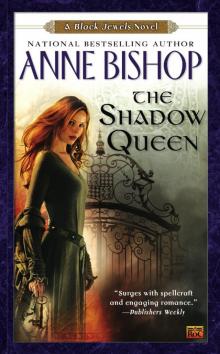 The Shadow Queen
The Shadow Queen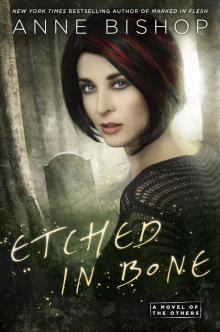 Etched in Bone
Etched in Bone Wild Country
Wild Country Vision in Silver
Vision in Silver Sebastian
Sebastian Shadows and Light
Shadows and Light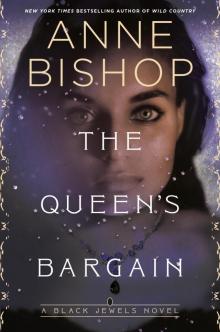 The Queen's Bargain
The Queen's Bargain Bridge of Dreams
Bridge of Dreams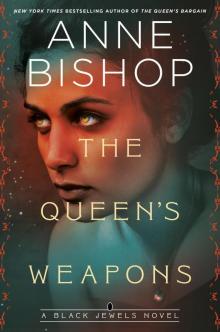 The Queen's Weapons
The Queen's Weapons Pillars of the World
Pillars of the World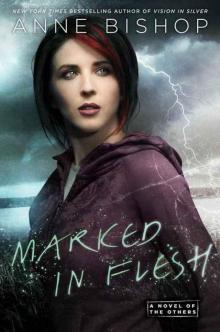 Marked in Flesh
Marked in Flesh Heir to the Shadows dj-2
Heir to the Shadows dj-2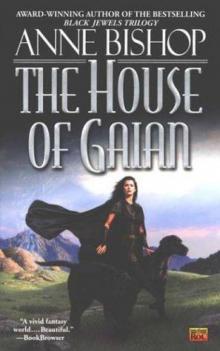 The House of Gaian ta-3
The House of Gaian ta-3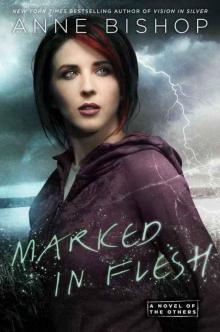 Marked In Flesh (The Others #4)
Marked In Flesh (The Others #4) Dreams Made Flesh bj-5
Dreams Made Flesh bj-5 Written In Red: A Novel of the Others
Written In Red: A Novel of the Others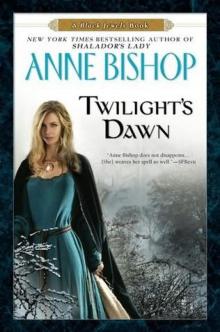 Twilight's Dawn dj-9
Twilight's Dawn dj-9 Shalador's Lady bj-8
Shalador's Lady bj-8 The Pillars of the World
The Pillars of the World Bridge of Dreams e-3
Bridge of Dreams e-3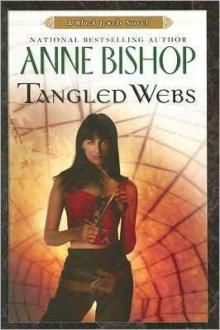 Tangled Webs bj-6
Tangled Webs bj-6 Murder of Crows: A Novel of the Others
Murder of Crows: A Novel of the Others Sebastian e-1
Sebastian e-1 Queen of the Darkness bj-3
Queen of the Darkness bj-3 Belladonna e-2
Belladonna e-2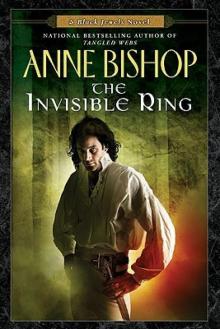 The Invisible Ring bj-4
The Invisible Ring bj-4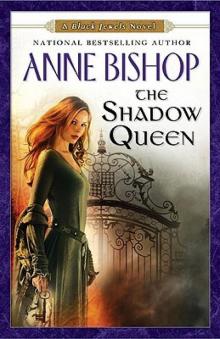 The Shadow Queen bj-7
The Shadow Queen bj-7 Shadows and Light ta-2
Shadows and Light ta-2 Daughter of the Blood bj-1
Daughter of the Blood bj-1 The Voice: An Ephemera Novella(An eSpecial from Roc)
The Voice: An Ephemera Novella(An eSpecial from Roc)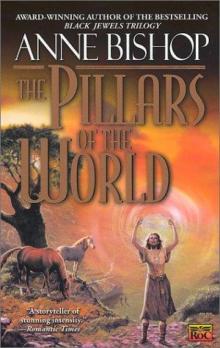 The Pillars of the World ta-1
The Pillars of the World ta-1